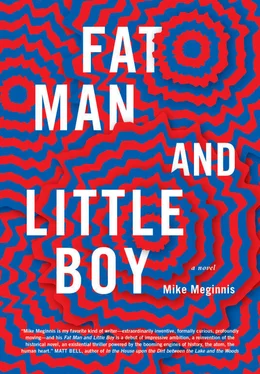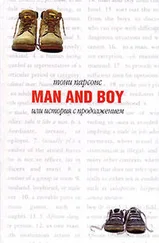Mike Meginnis
FAT MAN AND LITTLE BOY
a novel
for Tracy, my first and best reader
Two bombs over Japan. Two shells.
One called Little Boy, one called Fat Man. Three days apart. The one implicit in the other.
Brothers.
If a person were to film them falling, it would have to be from a great distance, through a veil of Japanese cities: old homes, new factories, idling cars, passing carts, and kites. Little Boy or Fat Man a black spot, center-screen. Encircled, in future broadcasts, by white light: an emphatic moon where otherwise they would be missed, descending as the gnat-speck plummets.
Until pika don—“flash boom.”
Or one might film them from the plane above. Some enterprising journalist or rising military star would begin with the shell in profile, waiting in the plane’s cold, clamorous womb. It would fill the screen.
Then the hatch would open underneath. Fat Man or Little Boy would drop out of sight. The camera would pan down to watch the bomb shrink until it was a pinprick. Until it could not be sorted from the landscape below—the factories, the homes, the tangle of power lines.
Until pika don.
The swell of light.
FAT MAN MEETS
HIS BROTHER
Two soldiers tall and short at the edge of what was their city. Their empty rifles at rest on their shoulders. These cast long, frail shadows across gray earth. The tall soldier has a bright bolt of silk bundled in his free hand, tucked up against his gut. The short soldier has been limping several days; his foot snags on an empty can. The tall soldier catches him by the elbow. A word of gratitude. The tall soldier slows his pace to ease his fellow’s travel.
Two soldiers search for living things and dead. Search for useful things and not. To see what has become, and come, and comes, becoming. To visit. To crawl. To know. When they grow tired they will rest in beds of ash or on well-angled slabs of concrete. They will sleep or they will close their eyes and pretend. They will feel a mystery at work beneath their skins.
They come to what was once a home. One wall still stands, the rest suggested by foundations—it was two stories, narrow, built from white stone. The morning’s low sun shines through an open second-story window, shutters skewed, glass blown out. Although through the window, or the window’s absence, it seems perhaps a little dimmer, a little more gray, as if colored by memory of glass.
Beside what was a home, in the long shadow of the standing wall, a bomb shelter. Squat concrete box two-thirds submerged. Stairs fitted to a niche in the earth, eight of them, deep. The tall soldier goes down first. He aims his empty rifle at the door. The short soldier follows down and reaches around him to open the door, slowly, slowly, unlocking it first with the key that they found. He levels his rifle as well. They put the business ends of their weapons through the narrow opening. They lead with these, and cast new shadows on the far wall. The short soldier stays behind the tall so as to hide his limp.
Inside there is a fat man lying naked on his side, arms wrapped around himself, hands tucked beneath, knees pressed to gut. A candle flickers by his side. The flame leans toward him as if pulled. His hair is all burnt off, eyebrows too, and beard. His head is fuzzed with brown stubble. His body smooth and hairless like a baby’s body. Pink and pale. Soft.
Fat Man opens his eyes. He asks the soldiers a question. It must be English. He asks another, plaintive. His whole body racked with shivering as the fresh, cold air comes in. His whole skin reared up in gooseflesh. He asks another question.
The tall one throws him the bright fabric bundle. Its falling unfurling reveals a robe, silk and purple, embroidered with a blue flower pattern. It falls over his body, across his hips. He asks another question. He touches the silk and rubs it between his fingers, face twitching with hints of surprise, pleasure, fear, need, want. He asks another question. The tall one tells him to be quiet, though Fat Man will not understand.
The day they brought him his robe they did not bring anything else, or ever come back, until the next day, when his feeding was resumed.
Fat Man can stand inside the bunker, barely. Sometimes he paces, stooped for fear of bumping his head. Sometimes he sits up, folds his legs beneath him, and commences waiting for his daily meal. Sometimes he thinks about what he has done. How it was to fall. To explode.
Now, the Japanese soldiers come once a day. They open the door enough to let in a long sliver of light, which is crossed intermittently by the slanted shadows of their arms and legs, and which climbs the wall as tap water climbs a glass. They lead with the tips of their guns so he knows they can kill him if they want to do that. He wants to know why they don’t want to do that. He asks but they do not say. He asks them if he is free yet. He asks them when he will be free or otherwise dealt with. He considers the possibility of escape. The odds look slim. He is not quick on his feet. He asks them what’s happening outside. He asks them how bad has it gotten or if things are better. They slide in a bowl of sticky white rice and a black crust of bread. They slide in a bowl of water. They give him candles and matches. He thinks the matches may be useful, and so he saves them, using the candles to light one another, pressing them end to end as if they are kissing.
He can tell when night falls by the distant hum of crickets, certain bird calls, and the quality of the air. He lets his candle burn until it is a glossy little pool of burning wax, a circle of fire. The wax spreads beneath it, becoming a spider. The spider’s body becomes a char circle, becomes an ashy mushroom cap on the floor. The fire goes out. Then it is time to lie in the dark and do his best to sleep. His arms curled up beneath his head to make a pillow, his knees against his keening gut, he shivers. He rolls a little back and forth to make warmth.
He remembers. Dreams and memory devour the night, mingled beyond recognition. Half-faces and crumpled hands, footprints, coral reef.
He pees in the corner. He tries sometimes to open the door in case they have forgotten to lock it. The door locks from the outside and the inside, but they have the key. They have not yet forgotten to lock it. He has considered blocking the door with his body so they cannot come in. He thinks they could not shoot him through the heavy door. But neither could they feed him.
He tries to tie his robe more tightly closed. There is too much give in the cloth. The sleeves are frayed and offer little warmth. The bunker grows hot at midday, after the soldiers come with his meal and before his hunger remembers itself. It grows cold in the night.
He sits at the center of the room, making shadow puppets in the light of his candle, pretending to be a tree. Pretending to sway in the wind. Watching his tree-shadow sway as he sways. He makes a hand-turtle come out of its shell, tremble at the world, and duck back in. Peering from inside, sniffing the air. He makes a hand-rabbit leap around the room until it falls and breaks its leg. It snuffles, waits to die.
He is given to uncontrollable fits of sobbing without apparent cause, or with causes too trivial for words: the way his walrus shadow climbs the wall so that his head looms on the ceiling like an astral body. The first and last sparks of certain candles. The way his water trickles back between his feet after it rolls down the wall.
On the fourth day he can’t hold it in anymore. He shits on the floor. The smell is terrible, though his candles obscure it, and on the fifth day the soldiers come in to see what he’s done. There are purple blotches all over their faces and necks but he doesn’t know what it means. They curse at him, using the only English words they know, as one guards him with a ready rifle and the other scoops up his mess with a shoe. It leaves a long brown smear like a sunflower shadow. The smell fades.
Читать дальше












